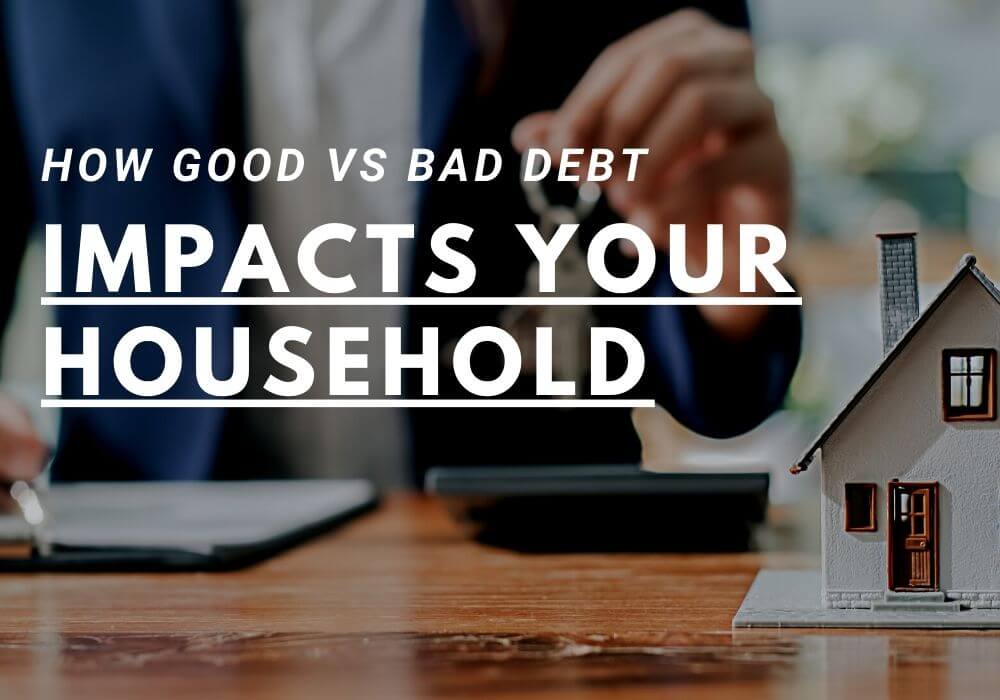In order to understand the difference between good and bad debt, it’s important to track your income and expenses and established saving goals for your family.

Financial stability allows you to meet the needs of your household expenses and puts less pressure on your relationship with your partner. With a little room in your budget, it makes it easier to plan for large expenses such as vacations, college tuition and, eventually, retirement.
When you have financial stability, it can take a lot of stress off of your partnership. In fact, lack of financial stability leads to money problems that are the most common cause of divorce.
Budgeting and Saving
Setting up a budget allows you to see where your money truly goes each month. It also facilitates saving goals and whittling down your debt.
Here’s how you can get started today:
1. Gather up all of your bills, either on paper or electronically. Include fixed expenses such as utilities, mortgage or rent, car payments, and phone bills. Also include discretionary spending such as eating out, buying clothes and spending money on entertainment.
2. Gather all of your monthly income sources such as pay stubs, cash for freelance work, and any other source of income.
3. Now, create a budget worksheet or paper ledger to put all of your income in one column and all of your expenses on another.
4. You now have a monthly budget.
In order to save more money for financial goals and emergencies, you need to increase your income or decrease your expenses. This isn’t an easy process but tracking your expenses can help you commit and stick to a budget.
One of the most important decisions you make regards how you will balance debt and savings. If you have debt, pay down as much as you can each month. However, you should always put back a little money in savings for emergencies.
What Is Good vs. Bad Debt?
There are various institutions that track your credit score. These include Equifax and Transunion. How you use your credit affects your overall credit score. In turn, a high or low credit score can affect your ability to borrow money you need for your household goals.
For example, your credit utilization ratio tracks your available credit compared to your total credit limit. If you carry high credit card balances, your credit score will suffer. Credit card companies are likely to increase your interest rate and banks and other credit card issuers are less likely to extend credit to you and your family.
Paying your bills on time also impacts your credit score. However, if much of your monthly budget goes toward minimum payments on credit cards, it can become increasingly difficult to pay your bills on time.
Good Debt
There is such a thing as good debt. Your credit history tracks how long you keep and use credit cards. Using credit cards responsibly and regularly and paying off the balance each month is a great way to improve your credit history. Opening up more than one credit card in a short period can raise red flags for lenders and scoring agencies.
In a perfect world, you could pay cash for big ticket items such as a home. However, most people need to borrow money to buy real estate. Typically, investing in a home would be considered good debt. Even though you pay interest on the loan every month, you also increase your equity. Also, real estate generally rises in value over time, so homeowners realized a high return on investment when they sell their property.
Borrowing money for real estate investments or to start a business might also result in a great return on your investment.
How Can Debt Consolidation Help?
Debt consolidation loans can help you pay off bad debt. This solution also simplifies your monthly finances by giving you one payment instead of several. Before looking into debt consolidation, make sure you have your budget and savings plan in place. It won’t do you any good to borrow money to pay off your current debt if you haven’t developed the discipline to avoid going into debt once again.
